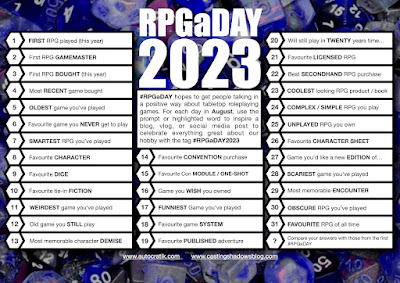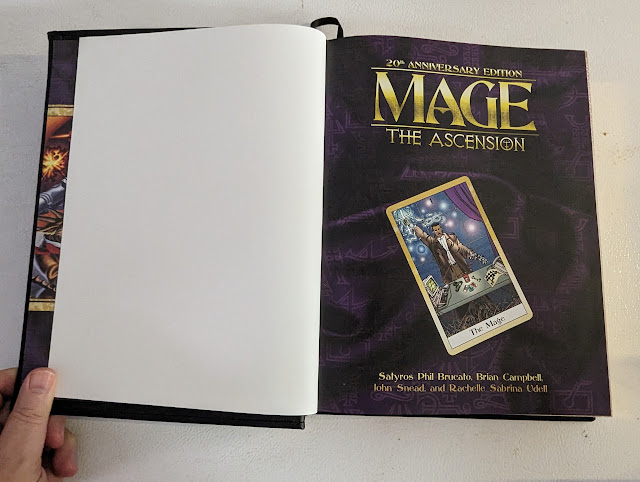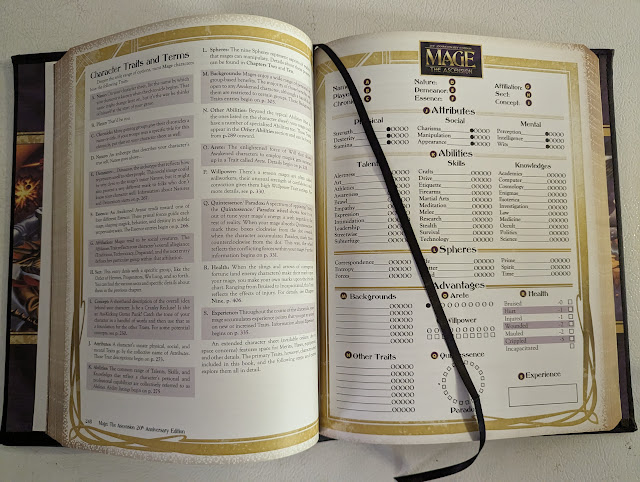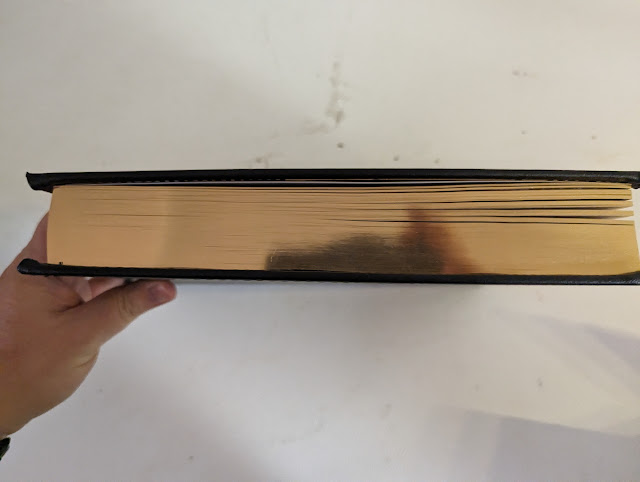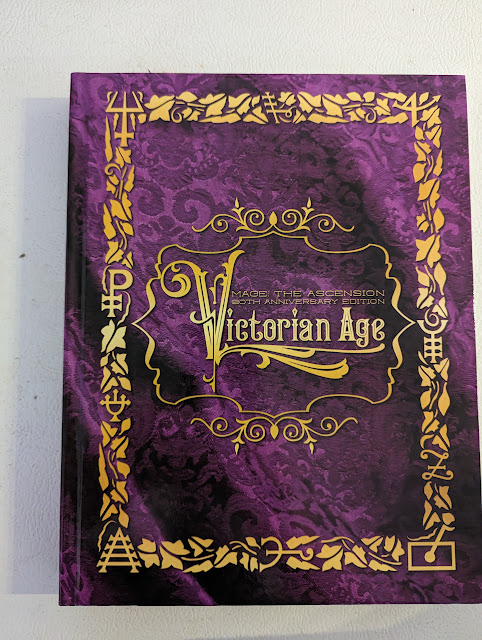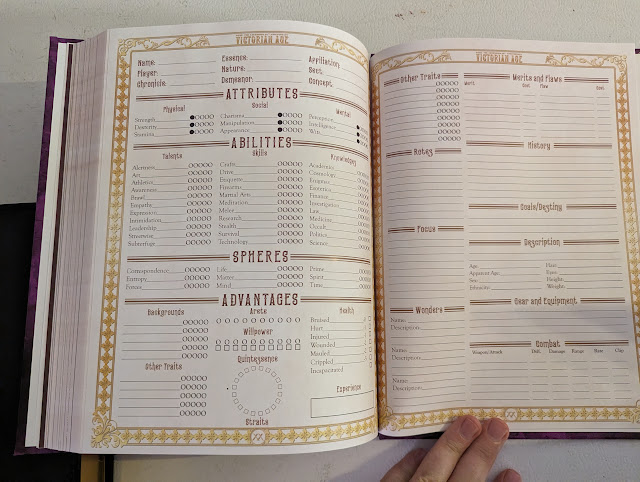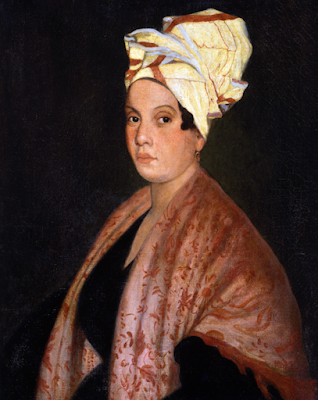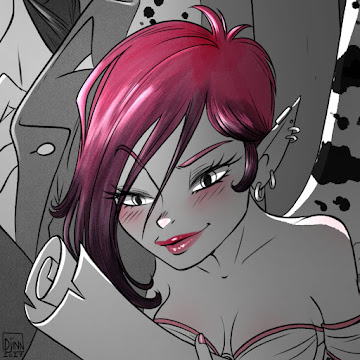Ravenloft Masque of the Red Death d20
2004. by Jackie Cassada, Claire Hoffman, Carla Hollar, Harold Johnson, Rucht Lilavivat, Nicky Rea, Andrew Scott, and Peter Woodworth. Art by Talon Dunning, Jeff Holt, Marcio, Fiorito, Brian LeBlanc, Jeremy McHugh, Claudio Pozas, and Beth Trott. Cover art by Ron Thompson. 288 pages. Hardcover.
There is no PDF option for this title at DriveThruRPG. So, for this review, I considering only my hardbound copy.
I LOVED Gothic Earth for Ravenloft AD&D 2nd Edition. To me, it felt like a bold attempt to try something brand new. Plus, I love Victorian Gothic Horror, so it was an easy win. But despite all of that, some of the things in Masque of the Red Death for 2ne Ed just really didn't work. The "new" Masque of the Red Death for the d20 rules fixes some of those problems. But does it measure up?
The background is largely the same, or at least I didn't see anything jump out at me as very different.
Chapter One: A History of Gothic Earth
This all feels very similar to the AD&D 2nd Ed version. I can't find anything here wildly different.
Like the original, there are sections of "Forbidden Lore" spread throughout the book.
Chapter Two: An Atlas of Gothic Earth
This chapter covers all the continents in a very brief manner. There is more here than the AD&D set, or at least it is presented with some more information. They still use a "Western" or even "British Empire" point of view here. I feel that this is the right way to do this. Why? The British Empire was at its zenith now, and this was the time when "the sun never sat on the British flag" so coming from this point of view works here. Plus why not add in the horrors of colonialism to it all as well.
I feel more lip service is paid to the Domains of Ravenloft here, but I am not able to quantify it in any meaningful way.
Chapter Three: Character Creation
This naturally has the most changes over its predecessor. It also has some changes over the D&D 3.x/d20 Modern rules. The six core classes are Adept, Athlete, Intellectual, Mystic, Sleuth, and Tradesman. For me this is the biggest improvement in these rules. The classes have be redesigned with an Earth-like world in mind. This is much better than trying to fit the AD&D classes into an Earth-shaped hole.
Each class also has a few sub-classes or specializations. I would recommend keeping a tighter hold on the subclasses. Most can be accomplished with the parent class and some roleplaying. But that is up to individual game masters, really. In truth, all the classes are good fits, and there is plenty of choices here.
Skills are expanded/shifted to cover a 19th-Century Earth environment. Same with the Feats.
Chapter Four: Money and Equipment
Re-read Dracula, esp. the last third of the book to see how important this is for a Victorian game. This is not a long chapter but it is an important one.
Chapter Five: The Magic of Gothic Earth
Magic on Gothic Earth is different. It is less powerful and more dangerous to the practitioner than it is in other D&D/d20 worlds. A bit of history is given, providing the background on why magic works and what is happening when the caster calls on these powers.
Spells from the D&D 3.x and the Ravenloft Player's Handbook 3.5 are listed for the new classes and some new spells are also detailed.
Gothic Earth is a magic-seeped world, but that doesn't mean mortals can or even should control it. There are no arch-mages here. Not anymore.
Chapter Six: Combat
Covers the sorts of combat that the PCs are likely to get into. Most importantly this covers the guns of the time.
Chapter Seven: Madness and Mystery
This chapter covers how the supernatural effects everything in the world of Gothic Earth, in particular magic and how people deal with the supernatural. This includes "insanity" rules. Now, I typically have a lot of issues with how games deal with sanity, madness, and psychological trauma. One nitpick here, they use "insanity" instead of madness. I typically prefer madness or even lunacy when doing Victorian-era games since that was the more common term. Thankfully we do not get a long list of mental illnesses here. I would rather see none than horribly wrong lists.
Fear, Horror, and Madness are all dealt with as a subset of the Will Save. Which actually works well for me.
Chapter Eight: A Practical Guide to the 19th Century
This is a great guide for any Victorian-era game. While Gothic Earth is mentioned, this is fairly system—and setting-free. The timeline of inventions (real) and popular books and music of the 1890s is quite fantastic.
We get into some "setting" details with the section on Clubs and Cabals. Some are real, and some are invented for this setting.
The "Language of Flowers" section is great addition. If you know your Victorian-era then you know how important this actually is.
Appendix I: The Villains of Gothic Earth
Ahh...The Usual Suspects! This is the crunchiest part of the book so far and that is expected. Featured here are Dracula, Imhotep, Frankenstein's Monster, Professor Moriarty (still a Rakshasa, not my favorite choice), Xavier Von Tuerin, Madame Delphine LaLaurie, and Sarah Winchester (of the Winchester Mansion).
Appendix II: Monsters in the World
A brief monster section on creatures unique to Gothic Earth.
Appendix III: Lairs of Evil
Covers what I would call "Sinkholes of Evil" and their effects. Some specific examples are given.
Appendix IV: Adventures in Gothic Earth
Covers how to run adventures in Gothic Earth and what makes them different. Several adventure ideas and seeds are given. One of my favorites is the "Ghosts of Salem."
There is a good index in the back to wrap it all up.
Comparing the Two Masques
Both editions of Masque of the Red Death are wonderful to have. There is a lot more detail for AD&D Second Edition (a boxed set and two more books) compared to the single book for 3.x/d20.
The 3.x/d20 edition "feels" like a better fit for the world.
What I can't tell is this. Do I like the AD&D 2nd Edition version because of the impact it made on me when I bought it and the 3.x/d20 version pales in comparison to that? Or is the 3.x/d20 quantifiably lacking in something?
I don't think it is, especially considering that I can use the additional AD&D 2nd ed Gothic Earth books with the 3.x/d20 version. I can also use other supplements like d20 Past, Gaslight, and many other Victorian OGL titles. Not to mention all the Victorian games I already have.
I really need to come back to this world sometime.















